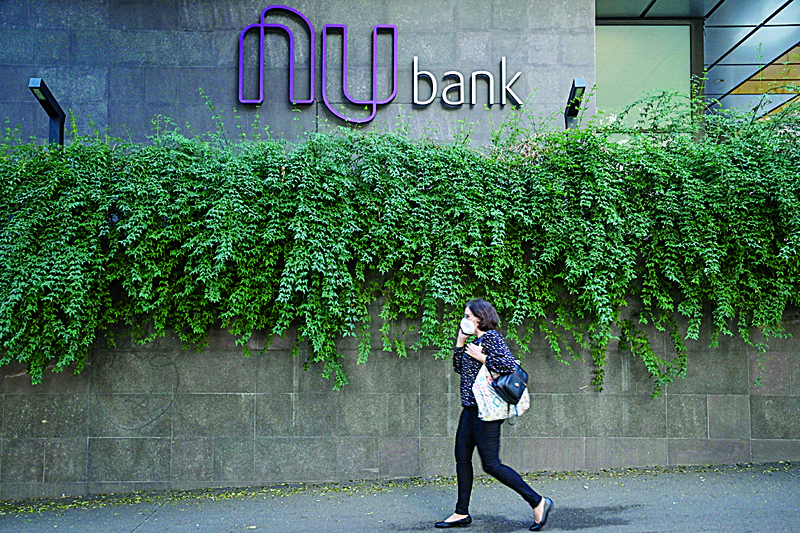 SAO PAULO, Brazil: In this file photo, a woman walks past Brazilian fintech startup Nubank headquarters, in Sao Paulo, Brazil. - AFP
SAO PAULO, Brazil: In this file photo, a woman walks past Brazilian fintech startup Nubank headquarters, in Sao Paulo, Brazil. - AFP
SAO PAULO: With 48 million clients, pop star Anitta on its board and a viral ad set to the beats of Brazilian funk, Nubank, a new digital-only bank, is shaking up the market in Brazil-and now eying a $50 billion entry on Wall Street. Launched in 2013 by an international trio of fintech entrepreneurs, the Sao Paulo neobank will make its initial public offering on the New York Stock Exchange on December 9, consolidating its meteoric rise.
Nubank is hoping to raise some $3 billion in its IPO, for a total valuation of more than $50 billion, which would make it Latin America's biggest bank, surpassing traditional Brazilian bank Itau Unibanco. It is the latest headline-grabbing moment for the disruptive upstart, which also wooed a $500 million investment from legendary investor Warren Buffett's Berkshire Hathaway in June. China's Tencent and Airbnb backer Sequoia are also investors in the firm, which is currently valued at around $30 billion, making it one of the world's biggest neobanks.
Offering free online accounts, credit cards for long-excluded lower-income clients and the mobility of banking by cell phone, Nubank promises a radical break with the high fees and stodgy bureaucracy of Brazil's traditional banks. It has been a massive success for its founders, Brazilian consultant Cristina Junqueira, US tech whiz Edward Wible and Colombian investment banker David Velez.
Velez, 39, now the company's chief executive, made Forbes magazine's list of the world's billionaires this year, with a fortune estimated at $5.2 billion-most of which he and his wife say they plan to donate. The next step for Nubank, which also has operations in Mexico and Colombia, is to turn a profit: The company reported a net loss of $171.5 million last year, and lost $99.1 million in the first three quarters of this year.
Funk and inclusiveness
Like fellow digital disruptors Banco Inter, Neon and C6 Bank, Nubank is tapping a young, dynamic market segment long neglected by traditional banks. "They have opened up more possibilities for middle- and lower-middle-class consumers, as well as an economically promising young demographic," said Thais Carnio, a banking expert at Mackenzie Presbyterian University in Sao Paulo.
That is revolutionizing a Brazilian market dominated by five big banks: Itau, Bradesco and Santander Brasil-all private-and state-owned Caixa Economica Federal and Banco do Brasil. "Digital banks, and Nubank in particular, have a greater capacity to quickly include people who would otherwise be unbanked," said finance professor Rafael Schiozer of the Getulio Vargas Foundation.
And there is still room to grow: Of Brazil's 213 million people, just 182 million use banking services, according to official figures. The number has risen fast during the coronavirus pandemic, which brought government stimulus payments for low-income families-fueling demand for bank accounts-and amplified the need for a credit or debit card to shop online.
Since March 2020, 17 million Brazilians have opened bank accounts. Over the same period, Nubank has nearly doubled its number of clients in Brazil, to 41 million. It has also expanded its product portfolio to include savings accounts, loans and insurance. It recently launched an investment platform, with a music video by Brazilian funk singer MC Jottape to promote it. "If the deal is juicy, I want my part. Whether it's suit-and-tie or shorts-and-sandals, we can own a piece," he sings in the video, shot in a poor favela neighborhood. "Now our people have a space, too." Adding to the bank's pop-culture pull, it appointed Brazilian superstar singer Anitta to its board of directors in June.
Potential pushback
Skeptics say Nubank now needs to prove itself by turning a profit. It could face pushback from traditional competitors and increased regulatory scrutiny along the way. Brazilian banking association Febraban recently warned that regulatory "asymmetries" could "distort competition" and give neobanks an unfair advantage over their traditional counterparts. Traditional banks, for example, face bigger capital requirements to issue credit cards, Febraban's director for regulatory issues, Rubens Sardenberg, told AFP. "The regulatory framework needs to adjust," he said. "A fintech start-up run out of a garage is one thing. A company going public on the stock exchange is another." - AFP




